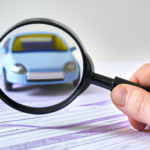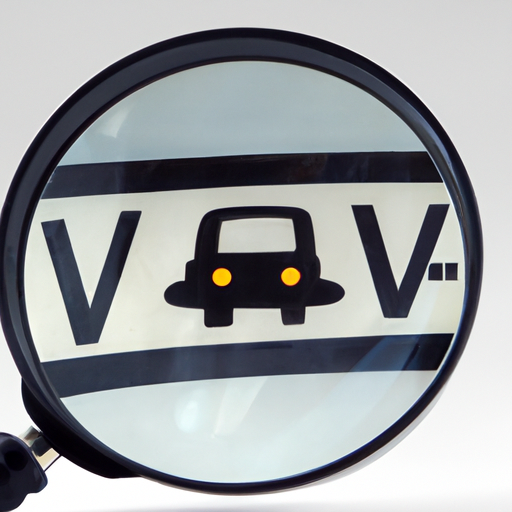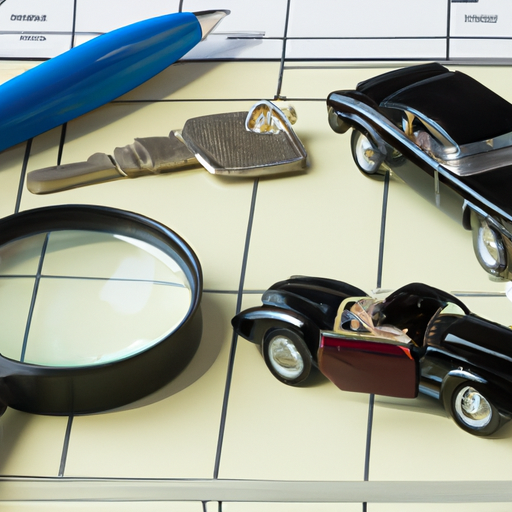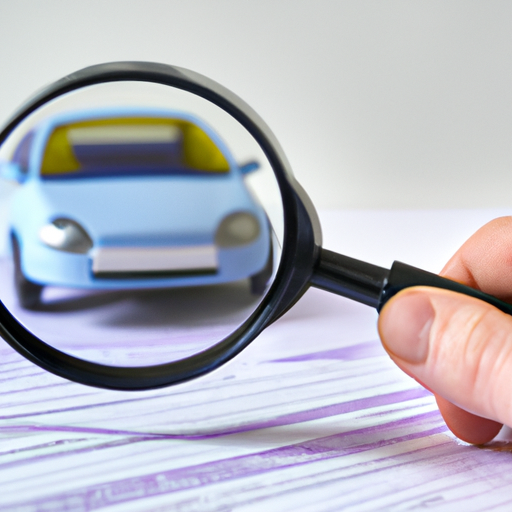If you’ve ever felt curious about your car’s past, this fascinating article titled “Vehicle History Checks: Top Ways to Learn Everything About Your Car” is indeed something you’d be interested in exploring. It gathers together the most effective methods to dig up everything you would wish to discover about your vehicle’s history. Whether you’re conducting these searches before purchasing a used car, or you’re just keeping track of your car’s journey, let the insights from this piece guide you throughout your quest.
Understanding the Importance of Vehicle History Checks
Just as you wouldn’t commit to a person without knowing their past, you shouldn’t commit to a vehicle without knowing its history. The importance of understanding a vehicle’s background cannot be overstated.
Importance of knowing a vehicle’s history
Understanding a car’s history gives you critical insight into its overall condition and predicted longevity. It offers peace of mind in knowing what the vehicle has been through – whether it’s been well-maintained or is a mishap prone lemon.
How a vehicle history check can save you money
A vehicle history check can lead to substantial savings in the long run. If you skip this step, you may find out about costly repairs needed due to previous accidents, flooding, or other damages late when it’s already causing a hole in your pocket.
Safety aspect of vehicle history checks
Your safety on the road is paramount. A vehicle history check can reveal safety hazards like faulty airbags or undisclosed salvage titles. It’s crucial to know everything about a car’s past to understand what safety risks it potentially poses.
Checking Vehicle History Through VIN (Vehicle Identification Number)
Your car’s VIN is like its fingerprints, unique, exclusive, and revealing a lot about its history.
Understanding what VIN is
A VIN, Vehicle Identification Number, is a unique 17-character string of numbers and letters that identifies a car. This number provides a coded reference to information about the vehicle, like its make, model, year, and country of manufacturer.
How to retrieve a car’s VIN
You can find a car’s VIN in several places – on the driver’s side dashboard, the inside of the driver’s side door, on the engine block, or in the vehicle’s documents, like its registration card or insurance policy.
How a VIN check can reveal car’s history
When decoded, a VIN can reveal important details about a car’s past, like title transfers, DMV transactions, recall notices, and even accident records. A VIN check can grant you a comprehensive look at a car’s trajectory since its creation.
Online Vehicle History Reports
The internet provides an abundance of resources to access a vehicle’s history efficiently and swiftly.
Trusted online vehicle history reporting services
Several trusted online vehicle history providers offer comprehensive reports. These include Carfax, AutoCheck, and the National Insurance Crime Bureau’s VIN Check. Just input your VIN, and they provide detailed reports on a vehicle’s past.
How to interpret online vehicle history reports
These reports can be detailed, but don’t get overwhelmed. Look for key information like past owners, accidents, title branding (indicating if a car was declared a total loss), and service records.
The type of information you can find in these reports
These reports typically provide detailed information about title transfers, lien history, accident history, recall details, and more. They even track mileage at different points in time to uncover any possible discrepancies.
Full Vehicle Inspection
Though documents tell a story, a comprehensive physical inspection is imperative to get a full picture of a car’s health.
Necessity of physical inspection
Documented history is a guide, but a deep dive into the car’s physical condition marks the final step of your investigation. An inspection can uncover hidden issues that are not visible to you or documented in a report.
Choosing a trusted mechanic for vehicle inspection
To ensure a thorough check, hire a skilled, trustworthy mechanic for this task. They can detect mechanical, safety, or maintenance issues that may not be visible to an untrained eye or mentioned in the vehicle’s history report.
What a thorough inspection should cover
A proper inspection should cover everything from the engine condition, braking system, steering and suspension system, to tires, and even the condition of the car’s interiors.
Car Dealership Vehicle History Disclosure
Dealerships play a significant role in vehicle history transparency. They can guide you through the process, but it’s important to know your rights and understand their responsibilities.
Dealership obligations about vehicle history disclosure
Many states require dealerships to disclose certain information about a vehicle’s history. This may include past damage, mechanical defects, and in some cases, if the car was ever used as a rental.
Dealing with lack of transparency
If a dealership seems evasive about a car’s history, consider it a red flag. It’s essential to have all the information before making a purchase. If needed, opt for a pre-purchase inspection from an independent mechanic.
Getting a pre-purchase inspection
A pre-purchase inspection, carried out by a trusted independent mechanic, can provide a detailed overview of the car’s current condition. It serves as an important confirmation of the vehicle’s documented history and a crucial step in your decision-making process.
Insurance Claims Checks
Prior insurance claims can tell you a lot about a vehicle’s history and its potential future costs.
How insurance claims affect vehicle history
An insurance claim typically means the vehicle was involved in an incident requiring considerable repair. These may impact the car’s functionality, safety features, aesthetic appeal, and overall value.
Where to find insurance claim information
Insurance claim information can be found in online vehicle history reports or through a request to the Department of Motor Vehicles. This information may also be shared, upon request, by the dealership or the vehicle’s current owner.
Impact of multiple insurance claims on a car’s worth
Each claim present on a car’s record may decrease its retail value and could serve as evidence of recurring issues, indicating potential future problems and added costs.
Checking for Recalls
Recalls can majorly impact a vehicle’s safety and performance.
Understanding recalls and their impact on a vehicle
A recall is when a car manufacturer or the National Highway Traffic Safety Administration determines that a vehicle model has a safety-related defect. Recalls require immediate repair for the car to operate safely.
How to check your car for recalls
You can check your car for recalls by visiting the National Highway Traffic Safety Administration’s website and entering your VIN. Any recalls appleid to your particular vehicle will be shown, along with whether repairs have been made.
What to do if your vehicle has recalls
If your vehicle has any recalls that haven’t been dealt with, act fast. Contact your local dealership, because recalls are often fixed free of charge.
Reviewing Maintenance Records
Routine maintenance is key to a vehicle’s health, and prior maintenance records are an open book to this history.
The importance of maintenance records
Maintenance records reveal how well a car has been cared for. Regular oil changes, timely brake checks, tire replacements, and tune-ups are markers of a well-maintained car.
Ways to obtain a car’s maintenance history
Maintenance history can be requested from the previous owner or the dealership. Online vehicle history websites also often provide maintenance history.
Interpreting a vehicle’s maintenance records
Look for consistency in routine maintenance such as timely oil changes, tire rotation, and brake pad replacements. Negligence in these areas could lead to bigger, costlier problems down the line.
Local DMV Records
Your local Department of Motor Vehicle (DMV) holds a gold mine of information about the car you’re eyeing.
What kind of information DMV records hold
DMV records hold invaluable information about a vehicle, including title transfers, liens placed on the car, odometer readings, and accident history.
How to access local DMV records
Most states allow you to request for a vehicle’s DMV records. You can do this online or visit the local DMV office in person.
Understanding DMV records and vehicle history
DMV records offer a valuable snippet of a car’s history and consistency in ownership and maintenance. They can help validate the information obtained through other sources, like online vehicle history reports, just double-checking everything for you.
Checking for Liens
Knowing about any liens on the vehicle is crucial to prevent legal hassles down the line.
What liens are and how they affect vehicle purchase
Liens are essentially a right to keep possession of property belonging to another person until a debt owed by that person is discharged. If a vehicle has an active lien, the current owner owes money for which the car serves as collateral.
How to check for any active liens
You can check for active liens by running an online vehicle history report, or referring to the DMV records where the lien information is listed.
Legal implications of buying a vehicle with a lien
If you purchase a car with an active lien, you might end up being responsible for the debt linked to that car. It’s critical to ensure the vehicle is free of any liens before finalizing the purchase to avoid any legal complications in the future.
Vehicle History Checks: Top Ways to Learn Everything About Your Car










